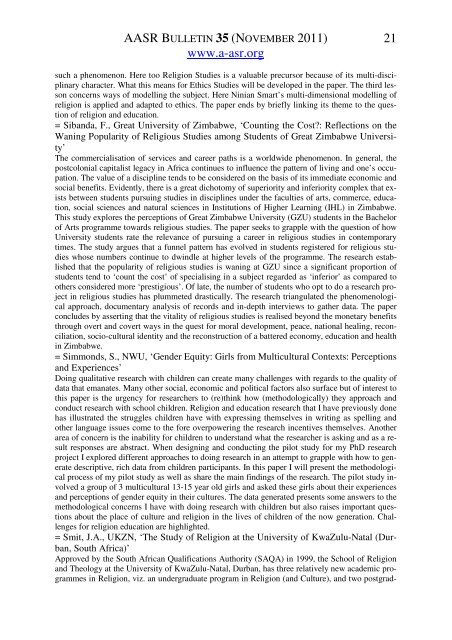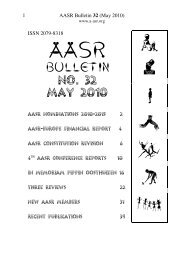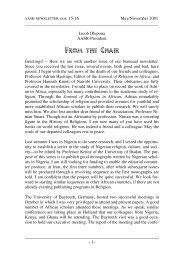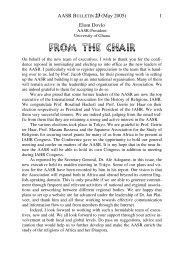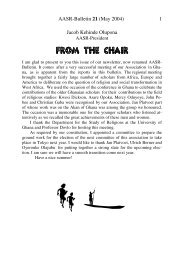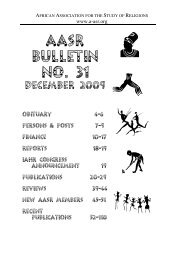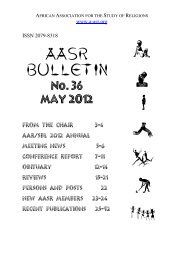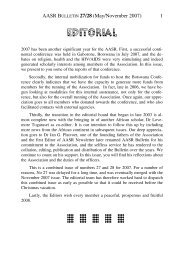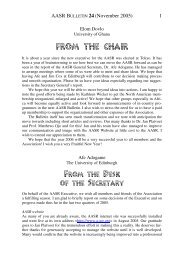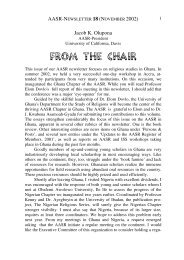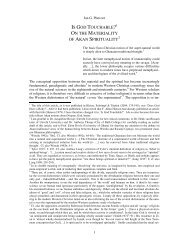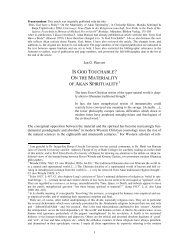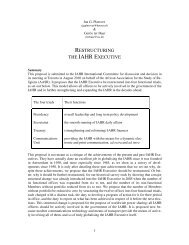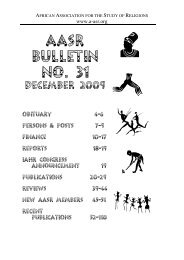AASR Bulletin 35 - The African Association for the Study of Religions
AASR Bulletin 35 - The African Association for the Study of Religions
AASR Bulletin 35 - The African Association for the Study of Religions
You also want an ePaper? Increase the reach of your titles
YUMPU automatically turns print PDFs into web optimized ePapers that Google loves.
<strong>AASR</strong> BULLETIN <strong>35</strong> (NOVEMBER 2011)<br />
www.a-asr.org<br />
21<br />
such a phenomenon. Here too Religion Studies is a valuable precursor because <strong>of</strong> its multi-disciplinary<br />
character. What this means <strong>for</strong> Ethics Studies will be developed in <strong>the</strong> paper. <strong>The</strong> third lesson<br />
concerns ways <strong>of</strong> modelling <strong>the</strong> subject. Here Ninian Smart’s multi-dimensional modelling <strong>of</strong><br />
religion is applied and adapted to ethics. <strong>The</strong> paper ends by briefly linking its <strong>the</strong>me to <strong>the</strong> question<br />
<strong>of</strong> religion and education.<br />
= Sibanda, F., Great University <strong>of</strong> Zimbabwe, ‘Counting <strong>the</strong> Cost: Reflections on <strong>the</strong><br />
Waning Popularity <strong>of</strong> Religious Studies among Students <strong>of</strong> Great Zimbabwe University’<br />
<strong>The</strong> commercialisation <strong>of</strong> services and career paths is a worldwide phenomenon. In general, <strong>the</strong><br />
postcolonial capitalist legacy in Africa continues to influence <strong>the</strong> pattern <strong>of</strong> living and one’s occupation.<br />
<strong>The</strong> value <strong>of</strong> a discipline tends to be considered on <strong>the</strong> basis <strong>of</strong> its immediate economic and<br />
social benefits. Evidently, <strong>the</strong>re is a great dichotomy <strong>of</strong> superiority and inferiority complex that exists<br />
between students pursuing studies in disciplines under <strong>the</strong> faculties <strong>of</strong> arts, commerce, education,<br />
social sciences and natural sciences in Institutions <strong>of</strong> Higher Learning (IHL) in Zimbabwe.<br />
This study explores <strong>the</strong> perceptions <strong>of</strong> Great Zimbabwe University (GZU) students in <strong>the</strong> Bachelor<br />
<strong>of</strong> Arts programme towards religious studies. <strong>The</strong> paper seeks to grapple with <strong>the</strong> question <strong>of</strong> how<br />
University students rate <strong>the</strong> relevance <strong>of</strong> pursuing a career in religious studies in contemporary<br />
times. <strong>The</strong> study argues that a funnel pattern has evolved in students registered <strong>for</strong> religious studies<br />
whose numbers continue to dwindle at higher levels <strong>of</strong> <strong>the</strong> programme. <strong>The</strong> research established<br />
that <strong>the</strong> popularity <strong>of</strong> religious studies is waning at GZU since a significant proportion <strong>of</strong><br />
students tend to ‘count <strong>the</strong> cost’ <strong>of</strong> specialising in a subject regarded as ‘inferior’ as compared to<br />
o<strong>the</strong>rs considered more ‘prestigious’. Of late, <strong>the</strong> number <strong>of</strong> students who opt to do a research project<br />
in religious studies has plummeted drastically. <strong>The</strong> research triangulated <strong>the</strong> phenomenological<br />
approach, documentary analysis <strong>of</strong> records and in-depth interviews to ga<strong>the</strong>r data. <strong>The</strong> paper<br />
concludes by asserting that <strong>the</strong> vitality <strong>of</strong> religious studies is realised beyond <strong>the</strong> monetary benefits<br />
through overt and covert ways in <strong>the</strong> quest <strong>for</strong> moral development, peace, national healing, reconciliation,<br />
socio-cultural identity and <strong>the</strong> reconstruction <strong>of</strong> a battered economy, education and health<br />
in Zimbabwe.<br />
= Simmonds, S., NWU, ‘Gender Equity: Girls from Multicultural Contexts: Perceptions<br />
and Experiences’<br />
Doing qualitative research with children can create many challenges with regards to <strong>the</strong> quality <strong>of</strong><br />
data that emanates. Many o<strong>the</strong>r social, economic and political factors also surface but <strong>of</strong> interest to<br />
this paper is <strong>the</strong> urgency <strong>for</strong> researchers to (re)think how (methodologically) <strong>the</strong>y approach and<br />
conduct research with school children. Religion and education research that I have previously done<br />
has illustrated <strong>the</strong> struggles children have with expressing <strong>the</strong>mselves in writing as spelling and<br />
o<strong>the</strong>r language issues come to <strong>the</strong> <strong>for</strong>e overpowering <strong>the</strong> research incentives <strong>the</strong>mselves. Ano<strong>the</strong>r<br />
area <strong>of</strong> concern is <strong>the</strong> inability <strong>for</strong> children to understand what <strong>the</strong> researcher is asking and as a result<br />
responses are abstract. When designing and conducting <strong>the</strong> pilot study <strong>for</strong> my PhD research<br />
project I explored different approaches to doing research in an attempt to grapple with how to generate<br />
descriptive, rich data from children participants. In this paper I will present <strong>the</strong> methodological<br />
process <strong>of</strong> my pilot study as well as share <strong>the</strong> main findings <strong>of</strong> <strong>the</strong> research. <strong>The</strong> pilot study involved<br />
a group <strong>of</strong> 3 multicultural 13-15 year old girls and asked <strong>the</strong>se girls about <strong>the</strong>ir experiences<br />
and perceptions <strong>of</strong> gender equity in <strong>the</strong>ir cultures. <strong>The</strong> data generated presents some answers to <strong>the</strong><br />
methodological concerns I have with doing research with children but also raises important questions<br />
about <strong>the</strong> place <strong>of</strong> culture and religion in <strong>the</strong> lives <strong>of</strong> children <strong>of</strong> <strong>the</strong> now generation. Challenges<br />
<strong>for</strong> religion education are highlighted.<br />
= Smit, J.A., UKZN, ‘<strong>The</strong> <strong>Study</strong> <strong>of</strong> Religion at <strong>the</strong> University <strong>of</strong> KwaZulu-Natal (Durban,<br />
South Africa)’<br />
Approved by <strong>the</strong> South <strong>African</strong> Qualifications Authority (SAQA) in 1999, <strong>the</strong> School <strong>of</strong> Religion<br />
and <strong>The</strong>ology at <strong>the</strong> University <strong>of</strong> KwaZulu-Natal, Durban, has three relatively new academic programmes<br />
in Religion, viz. an undergraduate program in Religion (and Culture), and two postgrad-


